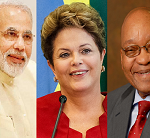Prime Minister Narendra Modi is in Brazil to attend the Sixth BRICS summit. During his meeting with Brazil’s President Dilma Rousseff, Mr. Modi will review India’s bilateral relations with Brazil – with which India is committed to a strategic partnership.
During the term of the visionary Brazilian president Luiz Inácio Lula da Silva Lula between 2003-11, Indo-Brazil partnership soared to new heights. But his successor Ms. Rousseff has given little priority to foreign policy, focusing more on domestic issues. Along with the passive approach of former prime minister Manmohan Singh, this meant a loss of momentum in bilateral relations over the last three years. Mr. Modi now needs to take the initiative and re-energise ties between India and Brazil.
The IBSA (India-Brazil-South Africa) Dialogue Forum, a fascinating alliance of the leading democracies of the three continents, has come to be marginalised by BRICS in recent years. But IBSA is equally important, if not more, for India. IBSA’s objectives are distinct from those of BRICS in which China and Russia represent the status quo in global power equations. Mr. Modi should talk to the Brazilian and South African presidents to rejuvenate IBSA and keep its identity and aspirations alive.
After the BRICS summit in Fortaleza, the Brazilians have organized a meeting for the BRICS leaders with the pPresidents of South America in Brasilia. This is a clever and imaginative attempt by the Brazilians to bridge their regional leadership with their BRICS alliance.
This is perhaps the first time an Indian prime minister will get the opportunity to meet all the South American leaders together. In the last two decades, South American leaders have started pursuing a more autonomous and assertive foreign policy with strong belief in a multipolar world and multilateralism.
They have freed themselves from the stigma of being called the “backyard of United States’’. This is evident from their success in thwarting the U.S. proposal of forming a hemispheric Free Trade Area of the Americas. They have preferred to become collectively strong through UNASUR (South American Union). In this context, the South American leaders, most of them from the pragmatic centre-left, will welcome Modi’s proactive role in global affairs and will look forward to working with India on many issues of common interest.
South America is emerging as a contributor to India’s energy and food security. Venezuela, Brazil, Ecuador and Colombia have started supplying crude oil to India regularly. While there is growing gap between India’s domestic production and demand, South America has the potential to increase its oil production and exports in the future.
India has been importing more than a billion dollars’ worth of soy and sunflower oil annually from Brazil and Argentina. Here again, India’s need for more imports in the future will be met by the two South American countries, who are agricultural powerhouses with large areas of arable land, abundant water reserves and advanced technologies.
India has been annually importing over $2 billion worth of minerals (mainly copper) from South America, which has rich mineral resources. India will need more of these to fuel its high economic growth.
South American political and business leaders view India as a new, large and growing market for their exports. Conscious of the perils of overdependence on China, they are keen to diversify and cultivate India as a trade partner.
Argentina learnt this lesson when China imposed a ban on imports of Argentine soy oil in 2010 to express their displeasure with Argentina on some other issue. Argentina, the world’s largest exporter of soy oil, was shocked since China was till then the largest importer of Argentine soy oil. Argentina was relieved and grateful when India came to its rescue by doubling its imports of soy oil from Argentina in that difficult year.
Indian pharma’s low-cost, generic medicines have helped South American nations reduce their healthcare bills. The governments of Brazil and Chile have invited Indian pharma companies to set up shop. South Americans also appreciate the fact that Indian IT companies in the region provide jobs and training for their young people.
As South America is emerging as a significant trade partner, India should deepen and widen the PTAs (Preferential Trade Agreement) with Chile and Mercosur, and consider upgrading them to FTAs, as also sign FTAs with Colombia and Peru, the second and third largest destinations for India’s exports to South America.
India should also increase lines of credit to South American countries, and sign Double Taxation Avoidance Agreements with the major countries to facilitate Indian investment and exports.
More importantly, Mr. Modi should have accepted Brazil’s invitation to watch the World Cup finals and derived inspiration to improve Indian football in collaboration with the South Americans.
Ambassador R. Viswanathan is Distinguished Fellow, Latin America Studies, Gateway House. He is the former Indian Ambassador to Argentina, Uruguay, Paraguay and Venezuela, and Consul General in Sao Paulo.
This article was exclusively written for Gateway House: Indian Council on Global Relations. You can read more exclusive content here.
For interview requests with the author, or for permission to republish, please contact outreach@gatewayhouse.in.
© Copyright 2014 Gateway House: Indian Council on Global Relations. All rights reserved. Any unauthorized copying or reproduction is strictly prohibited


